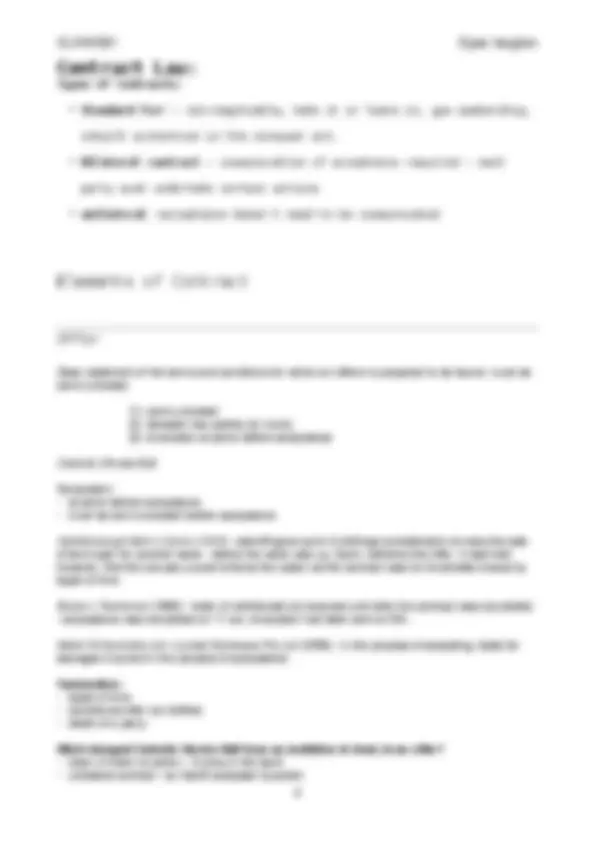Download Contract Law: Types of Contracts and Their Elements and more Lecture notes Communication in PDF only on Docsity!
CLAW
Semester 2, 2105
Elyse Vaughan
Contract Law:
Types of Contracts:
- (^) Standard form - non-negotiable, take it or leave it, gym membership, inbuilt protection in the consumer act. - (^) Bilateral contract - communication of acceptance required - each party must undertake certain actions - (^) unilateral -acceptance doesn't need to be communicated
Elements of Contract
Offer
Clear statement of the terms and conditions for which an offeror is prepared to be bound. must be communicated (1) communicated (2) between two parties (or more) (3) revocation anytime before acceptance Carbolic Smoke Ball Revocation:
- (^) anytime before acceptance
- (^) must be communicated before acceptance Goldsborough Mort v Quinn (1910) - plaintiff gave quinn 5 shillings consideration to keep the sale of land open for another week - before the week was up, Quinn withdrew the offer. It was held however, that the company could enforce the option as the contract was not revokable except by lapse of time. Bryne v Tienhoven (1880) - letter of withdrawal not received until after the contract was completed.
- acceptance was completed on 11 oct, revocation had been sent on 8th. Mobil Oil Australia Ltd v Lyndel Nominees Pty Ltd (1998) - in the process of accepting, liable for damages incurred in the process of acceptance Termination:
- (^) lapse of time
- (^) conditional offer not fulfilled
- (^) death of a party What changed Carbolic Smoke Ball from an invitation to treat, to an offer?
- (^) claim of intent to action - ‘money in the bank’
- (^) unilateral contract - so Carilill accepted by action
- (^) it was not just puffery and not an invitation to treat *
- (^) and there was due consideration - benefits to the offeror or the offeree Invitation to Treat - preliminary communication between parties during the negotiations e.g. a price list or display of goods in a shop front. Not an offer, but looking for an offer Fisher v Bell [1961] display of knife in a shop - cant sell, it wasn't an offer for sale, but an invitation to treat Responding to an offer: I. Seek more information: Stevenson Jacques & Co v McLean (1880) 5 QBD 346
- (^) McLean presumed seeking more information was a counter offer, then he could reject this offer and sell the goods onto others. BUT he was entitled to damages because the goods were sold elsewhere II. Make a counter offer: Hyde v Wrench (1840) 3 Beav 334
- (^) a counter offer revokes the original offer from the offeror
- (^) should be differentiated from a request for further information - e.g Stevenson Jaques & Co v Mclean
- (^) Hyde made a counter offer, didn't accept on the offer, Wrench has a right to reject this counter. III. Reject the offer IV. Accept the offer: contra The Crown v Clarke (1927) 40 CLR 227
- (^) on its terms, not changing it
- (^) Implied acceptance - acting consistently with the terms of the contract V. Ignore the offer (do nothing)














